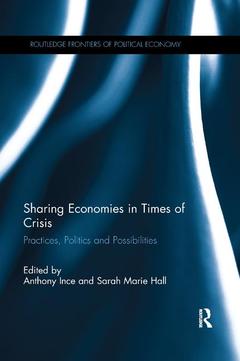Description
Sharing Economies in Times of Crisis
Practices, Politics and Possibilities
Routledge Frontiers of Political Economy Series
Coordinators: Ince Anthony, Hall Sarah Marie
Language: English
Subject for Sharing Economies in Times of Crisis:
Keywords
Charitable Food Banking; Sharing Economy Platforms; sharing economies; Food Parcel Distribution; economics; politcal economy; Makivik Corporation; crisis; Airbnb Host; cultural studies; UK Today; human geography; Welfare Reform; political science; Trussell Trust; Sarah Marie Hall; Extended Family Living; Laura Pottinger; Extended Family Households; Chris Gibson; Food Banks; Natascha Klocker; UK National Average; Erin Borger; Seed Savers; Sophie-May Kerr; Private Rented Sector; Juliana Mansvelt; Differential Construction; Mark Jayne; Seed Swap; Gill Valentine; Alcohol Related Violence; Sarah L; Holloway; Allotment Holder; Paula Bialski; Hospitality Platforms; Emma Waight; Settler Colonial State; Nicola Livingstone; Motherly Consumption; Katharina Hellwig; Recent UK Government; Russell Belk; Airbnb Website; Felicitas Morhart; Contemporary Societies; Lucy Sargisson; Nicole Gombay; Richard White; Colin Williams
Publication date: 12-2019
· 15.6x23.4 cm · Paperback
Publication date: 09-2017
· 15.6x23.4 cm · Hardback
Description
/li>Contents
/li>Readership
/li>Biography
/li>
The ?new sharing economy? is a growing phenomenon across the Global North. It claims to transform relationships of production and consumption in a way that can improve our lives, reduce environmental impacts, and reduce the cost of living. Amidst various economic, environmental, and other crises, this message has strong resonance. Yet, it is not without controversy, and there have been heated debates over negative dimensions for workers and consumers alike. This book stretches far beyond the sharing economy as it is popularly defined, and explores the complex intersections of ?sharing? and ?the economy?, and how a better understanding of these relationships might help us address the multiple crises that confront contemporary societies.
The contributors to this book explore a wide diversity of sharing systems and practices from various empirical case studies, ranging from hospitality to seed-swapping, and from indigenous land rights to alcohol consumption. In each chapter, a different crisis or vulnerability frames and shapes the study, allowing contributors to unpick the ways in which crisis and sharing relate to each other in real life. The book is divided into three thematic sections. Following an extended introduction to the themes and ideas of the book by the editors, the first section foregrounds the shaping of sharing practices by already existing or anticipated crises. The second section focuses on the lived relations between sharing and economic practice. In the third section, authors conclude the book by exploring the possibilities and challenges for creating alternative economic forms grounded in practices of sharing.
This edited volume makes a major, original contribution towards academic understandings of sharing economies in the context of crises. It is suitable for both students and academics who are interested in political economy, economic geography and consumption.
Foreword
By Clive Barnett
Chapter 1. Introduction: Sharing Economies in Times of Crisis
By Sarah Marie Hall and Anthony Ince
Part 1: Sharing In and Through Crisis
Chapter 2. ‘It feels connected in so many ways’: circulating seeds and sharing garden produce
By Laura Pottinger
Chapter 3. Malleable homes and mutual possessions: caring and sharing in extended family households as a resource for survival
By Chris Gibson, Natascha Klocker, Erin Borger and Sophie-May Kerr
Chapter 4. Reciprocity in Uncertain Times: Negotiating Giving and Receiving Across Time and Place Among Older New Zealanders
By Juliana Mansvelt
Chapter 5. Relationships, reciprocity and care: alcohol, sharing and ‘urban crisis’
By Mark Jayne, Gill Valentine and Sarah L. Holloway
Part 2: Sharing, the Economy and Sharing Economies
Chapter 6. Home for Hire: How the sharing economy commoditises our private sphere
By Paula Bialski
Chapter 7. ‘Hand-me-down’ Childrenswear and the Middle-class Economy of Nearly New Sales
By Emma Waight
Chapter 8. Franchising the disenfranchised? The paradoxical spaces of food banks
By Nicola Livingstone
Chapter 9. Shared Moments of Sociality: Embedded Sharing within Peer-to-Peer Hospitality Platforms
By Katharina Hellwig, Russell Belk and Felicitas Morhart
Part 3: Alternative Sharingscapes
Chapter 10. Swimming against the tide: collaborative housing and practices of sharing
By Lucy Sargisson
Chapter 11. Just Enough to Survive: Economic citizenship in the context of Indigenous land claims
By Nicole Gombay
Chapter 12. Crisis
Anthony Ince is Lecturer in Human Geography at Cardiff University, UK. His primary research interests concern the everyday spatialities of political agency in relation to wider-scale social and economic processes. Previous and current research includes radical social movements, local labour market change and non-financial economies.
Sarah Marie Hall is Lecturer in Human Geography at the University of Manchester, UK. Her research sits in the broad field of geographical feminist political economy: understanding how socio-economic processes are shaped by gender relations, lived experience and social difference.




